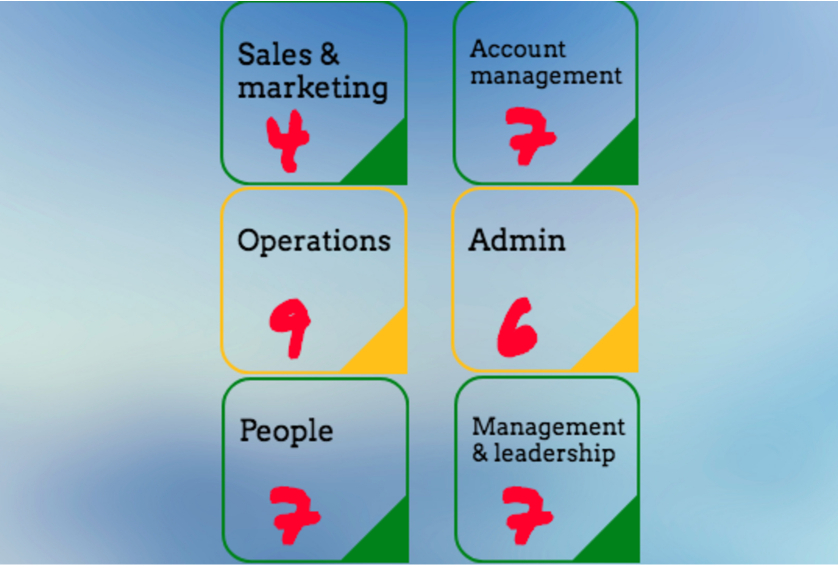There are only two reasons anyone buys anything. Either because they need it, or because they want it.
Needs are buying decisions made by the brain, and are based on logic. They’re basic; things that solve a problem. These are the minority of the buying decisions people make.
They’re more likely to make emotional buying decisions with their heart. This is about stuff they want. And these decisions make them feel good.
It’s these kind of purchases that gets your clients spending more with you to prevent future problems. No-one buys more stuff that they need… but they will happily buy lots more stuff that they want. Including peace of mind.
In fact, there is a direct correlation between how much stuff people choose to buy from you, and how happy they are with your business. The more they choose to spend, the happier they will be.
The number one marketing and growth book I recommend is called Influence, by Professor Robert Cialdini.
He’s a psychology professor, who has focused on marketing for the last 30 years. And this is “the” book on the psychology of the buyer, and how to influence them.
It’s a great read, I promise! I read it every Christmas (my wife says that makes me a dullard… but then I use Cialdini’s techniques to get my own way much of the time).
There are six weapons of influence.
Weapon 1: Reciprocity
When you give someone something for free it sets up a psychological need to return the favour. Waiters who give free mints with the bill get much higher tips.
In an IT support business, something as simple as a free sample or information will work. But the higher the perceived value of the freebie – the better the need to reciprocate.
How can you use this to get people to return more often, or spend more?
- A free strategic IT guide (remember that printed information has a higher value perception)
- A month’s support (so they can taste it)
- A free on-site strategic IT review (also known as a sales appointment)
- Paint a picture of a free upgrade: “We’re going to upgrade you to the gold standard”
Weapon 2: Commitment & consistency
When people make a commitment they are driven to honour it even if the original motivation is removed. You need to ensure that clients make a commitment to their next strategic IT review (the tool that retains them more than any other tool).
How could you get them to do that?
- Schedule the next review while they are on a support call
- Put them into a loyalty scheme that rewards them for staying with you
- Get them to sign an appointment form. Getting a signature is a huge commitment
- Sell them a support plan to lock them into your business. Pay as you go is not good for retention
Direct quote from Influence: “We fool ourselves from time to time in order to keep our thoughts and beliefs consistent with what we have already done or decided.”
Weapon 3: Social proof
People prefer to do things they see other people doing. Cialdini highlighted this in a simple test asking guests in a hotel to re-use their towels.
He laid out 5 different information cards, all of which had the same desired outcome, in hundreds of test hotel rooms.
The card that said “Join your fellow guests in helping to save the environment (75% participated last year)” had the best response from guests, at 44%. And that’s because it highlighted the fact that others participated.
You can use the same technique in your business.
Start by asking your support team to change the way they talk about support plans: “In theory, you only need to have your IT reviewed by a technician every 12 months. But 75% of our clients like you want enhanced support for their staff, and choose to have proactive reviews every 3 months for preventative maintenance. Shall I talk you through our ongoing support plans”
How else can you use social proof to get people back more often or spend more?
- Think about testimonials, case studies and reviews
- Remember photos and videos, as they don’t lie (especially videos)
- Highlight best seller lines. “This is our most popular option”; “Most of the other business owners we look after have chosen this brand”
Direct quote from Influence: “Since 95 percent of the people are imitators and only 5 percent initiators, people are persuaded more by the actions of others than by any proof we can offer.”
Weapon 4: Authority
People will obey authority figures, even if they are asked to perform objectionable acts.
The senior technician has more influence over what is spent than anyone else in the business does. Use this to your advantage and get the technician to recommend higher priced products, and persuade clients join the support plan.
Even just mentioning it makes it easier for other staff to do the actual selling.
Direct quote from Influence: “Once we realise that obedience to authority is mostly rewarding, it is easy to allow ourselves the convenience of automatic obedience.”
Weapon 5: Liking
People are more easily persuaded by people they like. The atmosphere in your business needs to be positive and your staff need to be likeable and easy to get along with.
Ideally you should aim for:
- A great atmosphere (warm feeling) with smiley staff who are enjoying themselves and their work
- Staff who match the audience you want to reach (because like attracts like)
- Well presented staff. They will sell more. So will good looking people
Weapon 6: Scarcity
Perceived scarcity generates demand. If you tell clients that you only have a limited supply of the senior technician’s time, they will be much more likely to buy from you there and then. But it must be real scarcity to be authentic.
What genuine scarcity do you have in your business?
- Limited number of on-site time
- Limited availability of key staff
- Products that sell out
- Limited edition offers
Direct quote from Influence: “The joy is not in experiencing a scarce commodity but in possessing it.”
Direct quote from Influence: “Our typical reaction to scarcity hinders our ability to think.”
PS If you have read Influence and want more, then Yes! 50 Secrets from the Science of Persuasion is more of the same.
And I can also recommend The Small Big: Small Changes that Spark Big Influence.






